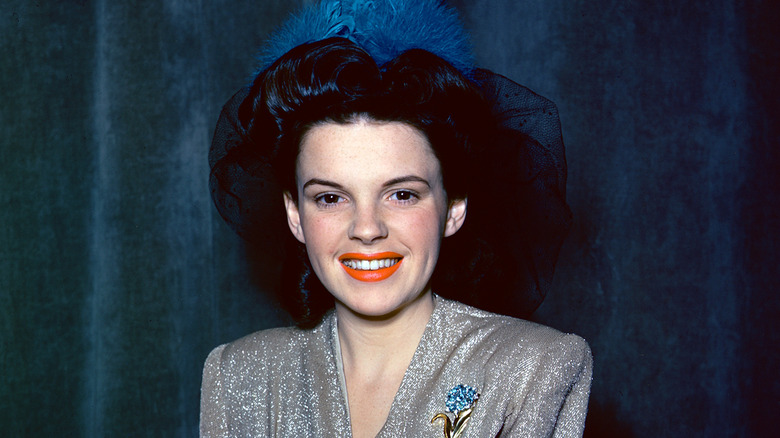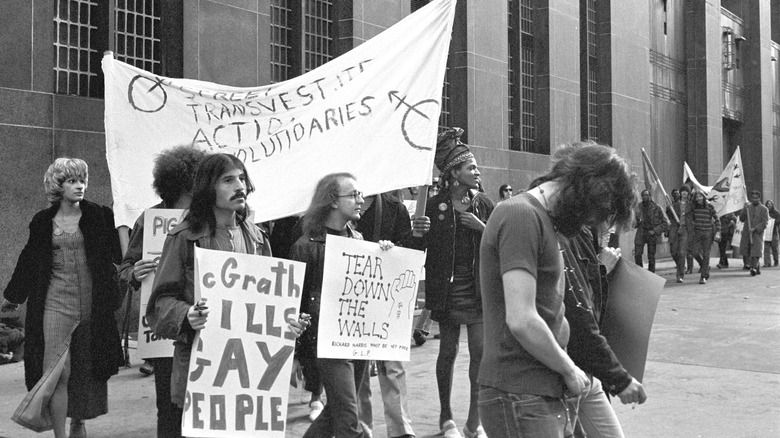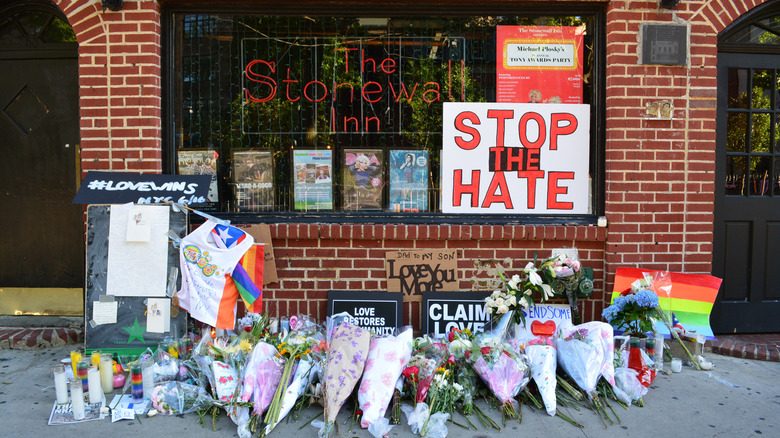All About The Theory Surrounding Judy Garland's Involvement In The Stonewall Riots
It turns out there may be a direct link between one of Hollywood's greatest stars and a major historical uprising. In 1969, a crowd of queer and trans youth protested against police who violently raided the Stonewall Inn, a well-known gay bar. Considered an important moment for the gay rights movement, the Stonewall riots continued for several days and led to larger organized protests in years to come. It also turns out that these protests happened to occur on the same day as Judy Garland's funeral procession.
The "Wizard of Oz" actor has been revered for standing up for her queer fans in the press before it was commonplace to do so, according to HuffPost. Making a connection between these two cultural moments, journalist Charles Kaiser suggested that Garland's death may have triggered a large emotional response within her largely gay fandom (via The Washington Post). In "The Gay Metropolis," Kaiser notes that Garland's funeral service occurred on the first night of the riots. He proposes that communal grieving may have emboldened people to act once confronted by police at the Stonewall Inn.
Despite Garland's uncontested status as a gay icon, Kaiser's theory has been widely challenged since he published "The Gay Metropolis" in 1997. While some queer people agree that Garland's passing may have inspired such significant action, others believe the theory is downright disrespectful.
There are mixed recollections of Stonewall and Judy Garland's involvement
Charles Kaiser's suggestion that Judy Garland's death inspired an entire community to act seems pretty far-fetched. In "The Gay Metropolis," Kaiser wrote of the riots: "No one will ever know for sure which was the most important reason for what happened next: the freshness in their minds of Judy Garland's funeral, or the example of all the previous rebellions of the sixties." While cultural movements can be inspired by many outside factors, the iconic actor doesn't seem to be a plausible cause for action. Fellow Stonewall historian David Carter argued that there were no queer eyewitnesses who mentioned Garland in their accounts (via Time).
However, it was also trans activist Sylvia Riviera's emotional reaction to Garland's death that also helped push the theory forward. Riviera helped lead the gay rights movement alongside Marsha P. Johnson and is even rumored to have thrown the first brick at Stonewall. In "Stonewall," Martin Duberman gathered firsthand accounts of the moments leading up to the historic riots. He recorded that Riviera was distraught upon hearing about Garland's death and had actually prepared a vigil for the songstress before being called to Stonewall, per Time.
This witnessing of how important Garland was to members of the queer community, especially community leaders such as Riviera, only added to the myth. However, in recent years, several riot participants have come forward to rebuke the theory as overshadowing the real movement.
Many eyewitnesses are against the Judy Garland theory
Long considered an icon in the queer community, Judy Garland's story of survival resonates with her fans. The actor's adored roles on-screen and complicated life off-screen have only grown her cult following since her passing. While her devoted gay fandom remains intact, many Stonewall rioters still alive today are against the theory that her funeral incited the riots. Thomas Lanigan-Schmidt, who was present at Stonewall, noted that most of the people who rioted weren't part of Garland's target demographic.
"There are people who connect [Garland's funeral] to the narrative of Stonewall, and you're not going to tell them it doesn't connect, so let them have it," he told The Washington Post. "It didn't start the riot off, believe me." Another participant in the riots, Mark Segal, agreed with Schmidt's contestation, writing that the Stonewall crowd listened to artists such as Diana Ross and Barba Streisand. Garland's music was not for dancing and appealed to an older audience (via Pride Source).
Segal also wrote that the myth of Judy Garland's death launching such an important movement does more harm than good. By associating the death of a celebrity with Stonewall, it writes off the severe and far-social injustice queer people were fighting against. "The truth is that we were fighting the hate and oppression of the police that night," Segal confirmed. "We were not empowered by a dead singer. Let's put that coffin into the ground already."


